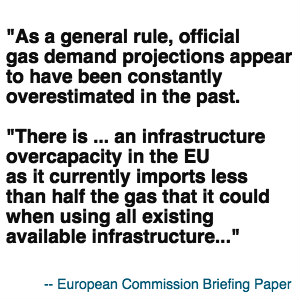 A while ago, the European Commission published another briefing paper about Nord Stream 2. A steadfast opponent of the planned big underwater pipeline aiming at expanding the gas transport capacity between Germany and Russia through the Baltic Sea, the Commission brings a set of arguments pointing to several reservations in connection with the project.
A while ago, the European Commission published another briefing paper about Nord Stream 2. A steadfast opponent of the planned big underwater pipeline aiming at expanding the gas transport capacity between Germany and Russia through the Baltic Sea, the Commission brings a set of arguments pointing to several reservations in connection with the project.
Interestingly, they use the same line of argument they completely ignore when it comes to other pipeline projects, particularly the Commission’s list of priority infrastructure projects, the PCI (Projects of Common Interest) list.
Nord Stream 2 Vs. the Commission’s Priority Projects: Stick and Carrot?
Having a closer look at some of the arguments, it is striking how contradictory the Commission’s narrative is on the project in question. The briefing paper laments that the Nord Stream 2 pipeline “would cost billions of euros that could be spent in other priority segments of the economy and the energy sector” and that the pipeline’s economic rationale ignores EU objectives on energy efficiency, renewables and research and innovation.
This is a warning that NGOs and grassroots groups have sounded several times in connection with the large amounts of money the EU Commission granted and will continue granting to several projects of common interest. In order to have a chance to stay well below 2 degrees of global warming, direct and indirect subsidies for fossil fuels have to cease; in particular, public money must not be invested in backward-looking technologies locking us into further decades of fossil gas use.
Diversification and Gas Demand – Diverging Approaches
Whenever Food & Water Europe spoke to European Commission representatives, we had discussions on the diversification need and on the already existing capacity to deal with the EU’s gas demand. The briefing mentions current EU gas import capacities of 700 billion cubic meters per year, concluding that there is “an infrastructure overcapacity in the EU as it currently imports less than half the gas that it could when using all existing available infrastructure.” This picture will not change in the future as even demand projections on the higher end could be accommodated by the capacity of current infrastructure.
And, just as NGOs repeatedly mentioned and the European Court of Auditors already criticized, the briefing confirms that “official gas demand projections appear to have been constantly overestimated in the past.” With these facts in mind it would only be logical to doubt the need for any new gas import infrastructure, including LNG terminals and the Southern Gas Corridors – all of which are projects that the EU Commission does support.
Concerning diversification, the briefing indicates that Nord Stream 2 will probably not enhance gas supply diversity and that in order to reduce the strong dependence on Russia as a gas supplier, the answer should be demand reduction, use of indigenous (renewable) resources and a well-functioning energy market. Repeatedly, Food & Water Europe pointed out the need for focusing on renewable energy and energy efficiency to move towards real independence from Russian gas.
Why does the Commission not think about these alternatives when it comes to other gas projects?
Security and Stranded Assets: Only an Issue with Nord Stream 2?
The questions of dependency on Russian gas and supply security are closely linked in the Commission’s gas narrative. Surprisingly though, in its briefing it states not only that Nord Stream 2 is not expected to enhance EU energy security, but that the “EU already has enough pipelines to import all the gas it needs, not to mention its liquefied natural gas terminals. Thus, the building of Nord Stream 2 will lead to stranded assets in the future (…)”. If the Commission (and this would echo clearly Food & Water Europe’s point of view) acknowledges the risk of stranded assets and the fact that the EU has already enough import terminals and pipelines, why does it still invest billions in the construction of exactly this kind of infrastructure, e.g. projects like Krk LNG terminal or the Trans Adriatic Pipeline, among others?
The EU Commission’s Swim with the Tide
The EU Commission has to stop swimming with the tide, subjecting some projects to justified criticism while praising others which are similarly unneeded and pointless. This certainly raises questions about the reasons underlying the European Commission’s position and suggests that they are beyond the simple aim of building a safe, sustainable energy system for all Europeans, and for our future.
We will not stop reminding the EU Commission of its purpose of helping to build a truly clean and secure power system compatible with the Paris Climate Change Agreement!


